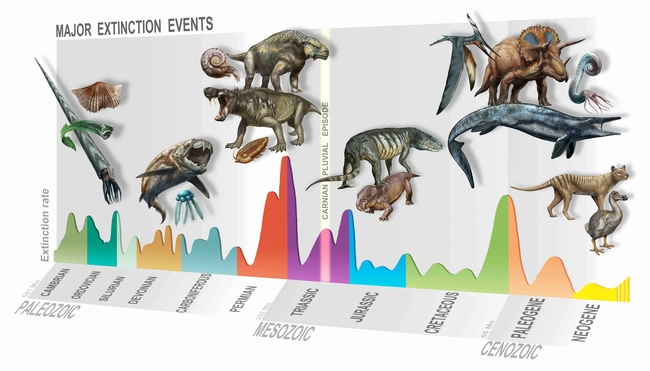14/10/2020 | 233 million years ago, a series of massive volcanic eruptions in present-day Canada provoked a climate change. These events led to the creation of new ecosystems, such as coral reefs, and favored the rapid spread of dinosaurs. This is the conclusion drawn by an international, interdisciplinary team of scientists in a new study comprising researchers from Jacobs University Bremen and the Leibniz Centre for Tropical Marine Research (ZMT).
The volcanic eruptions took place during the geological Carnian age. These events injected huge amounts of greenhouse gases into the atmosphere. This led to global warming and widespread humid conditions, causing an enormous loss of biodiversity and mass extinctions. As a result of this natural disaster, known as the ‘Carnian Pluvial Episode’, more than 33 percent of the marine genera disappeared, according to the study recently published in the renowned journal "Science Advances".
Dinosaurs already existed before, but they rapidly diversified during the Carnian Pluvial Episode. “This age is particularly interesting because it marks the birth of many animal and plant groups that dominate our current ecosystems," said Dr. Sönke Hohn, who is involved in the study on behalf of the ZMT.
On land and in humid environments, turtles, crocodiles, lizards, insects and even the first mammals appeared. Conifers and other groups of species spread out. In the sea, modern coral reefs and plankton groups evolved and the chemistry of the water changed dramatically. These "new" organisms were the forerunners of those that populate today's ecosystems. Therefore, authors of the paper describe this time as the "dawn of the modern world".
For their study, the team examined a large number of chemical elements and fossils. Through detailed synthesis work, the researchers were able to create a more comprehensive picture of the Carnian events and to show time-related cause-and-effect relationships.
"The Carnian Pluvial Episode was long overlooked. We are now able to analyze the processes in much greater detail, and over time scales of less than one million years”, says Dr. Agostino Merico, Professor of Ecological Modeling at Jacobs University and head of the Systems Ecology group at the ZMT. As part of the study, the expert in ocean biochemistry examined the effects of massive carbon dioxide emissions on the chemistry of seawater. The research project was financed by the Hanse-Wissenschaftskolleg (Institute for Advanced Study) in Delmenhorst.
Link to the study:





